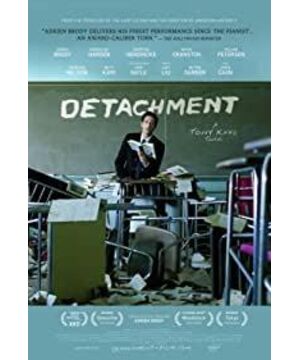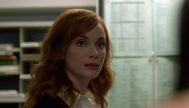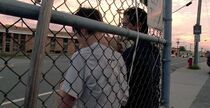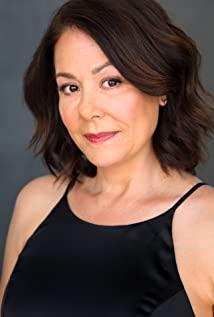The film unfolds from a metaphor of the cycle of life: a tree that grows and withers.
Then use a sentence from Camus as the opening remark:
"And Never Have I Felt so Deeply at One And the Same Time. So Detached From Myself and so Present in the World"
----Albert Camus
is also Henry's monologue.
Rather than seeing this film as a film that explores and reflects on the current American education system, it is better to simply withhold its name: Detachment - Detachment
This film is about teachers, students and campuses, but not Mona Lisa's smile or It is a movie about teachers like the Dead Poets Society illuminating students' self and life. It can't even be regarded as a movie about teachers and students. What is more prominent in the movie is the estranged and fragile relationship between individuals, family and the same kind. The theme is the scars of life and childhood, the existence.
The film presents clips of the chaotic and cruel fate of children in the school from the perspective and monologue of the hero Henry, as well as the pain, powerlessness and weariness of a group of teachers who believe in faith. In the school's chaotic classroom, the trapped students fight, use all kinds of swear words, dress improperly, spit at teachers, and abuse cats. And parents either abused teachers or used verbal violence against their children in order to protect their children. In comparison, although the teachers in the school are also suffering from misfortune and indifference in their families and life, they still have responsibilities towards their students. And Henry's past flashed back from time to time, intersecting with reality. It turns out that this sad and gloomy substitute teacher living alone has painful childhood memories of her mother being assaulted by her grandfather, addicted to alcohol and drugs, and finally found dead in the bathroom. He cared for his grandfather, who lived in a nursing home, who often brought up his mother with guilt. He hoped that his grandfather would repent in the diary, so that he could learn from it what happened that year. But the grandfather kept his guilt secret. When his grandfather was dying, he begged his daughter for forgiveness. Henry talked to his grandfather as his mother and forgave his grandfather so that he could leave in peace, but he never heard his grandfather admit his sins. After his grandfather passed away, Henry's last kinship in the world was gone. Henry's feelings for his grandfather are undoubtedly complicated. Grandfather has committed a crime and is his relative. He instinctively rejects and hates his grandfather, but he has to maintain a fragile relationship. He is still very tender to his grandfather. He was angry at the indifference between people: when he came to the nursing home in the middle of the night to bring his grandfather out of the toilet, he yelled at the elder sister at the front desk of the nursing home: You stay with these old people waiting to die all day but don't care, I paid my grandfather to send him here because I need your help. But you did absolutely nothing to help him. Know that your loved ones will be in nursing homes, and so will your children. We were all children once, and Henry and his students are a contrast. The present that his students are going through is his past, and he is the shadow of his students in the future. The wounds of childhood and adolescence afflict the children, some of whom perish and some who survive, with the shadows of the past.
There is alienation everywhere in this film, but it is full of tenderness and care as thin as a hair when dealing with various misfortunes. For example, when Henry wandered alone on the street at night, the narrator murmured the verses he wrote, and the flashbacks of Henry's childhood memories were soft, with bright colors, calm rather than violent. When the cat-abusing boy was questioned in the psychology teacher's office, he said,
"I feel trapped, like the cat." Fear was flashed in the eyes of the girl who didn't care in front of the teacher who was out of control. The close-up of Meredith as he bites down the poisonous cake so slowly, is the close-up of Meredith's farewell: a long long goodbye when here comes the long long death.
The attachment between Erica and Henry is the warmest part of the film. The encounter with Erica raised Henry's scars, and Erica's blowjob to an old man on the bus made him cry. Later, when they met again, Henry took her back to his apartment out of pity, and Henry's tenderness made Erica feel good and attached to him. Erica's attachment to him made Henry feel a long-lost warmth. There was no dialogue when the two went out, only the accompaniment of Ray LaMontagne's Empty, with flashbacks of Henry's childhood playful memories with his mother, which was so simple and happy that it made people cry. He saves Erica and vice versa.
People always want to maintain the independence of the spiritual world, but expect others to understand; they can't help but escape from this world, and they keep severing the ties to people, and they are afraid and sad in the distance.
"Those who really understand pain will be kind to others", Henry's tenderness comes from this, and his sensitive melancholy loneliness and the pain that he used to roar also come from this. Surviving his unhappy childhood, he did his best to guide his students to listen to their inner voice, respect their own feelings, and build their own awareness. But he can't help every student, he saves Erica, but he can't help Meredith, tragedy is always inevitable. In the first class, Henry asked the students to write a paragraph of what their relatives would say at his funeral. Meredith wrote the last words after suicide, without a signature. Meredith has been pouring her heart out, she needs understanding, she needs comfort. But she chose to take her own life when her final conversation was interrupted in the classroom. Henry, on the other hand, was afraid of being treated as a paedophile like a grandfather, didn't go to Meredith after getting angry with his colleagues, and decided to send Erica away.
Henry later said:
"A child's intelligent heart can fathom the depth of many dark places. But it can't fathom the delicate moment of its own detachment."
Meredithde's death filled Henry with regret and despair.
"Some of us believed that we can make the difference, and then sometimes we wake up, and we realize we failed. We have such responsibility to guide a young so that they don't end up falling apart, falling by the wayside, becoming insignificant. "
They have been trying to help the students, but in reality tragedies keep happening.
Another Camus quote might better sum up the film's theme.
Perhaps we cannot prevent this world from being a world in which children are tortured. But we can reduce the number of tortured children. And if you don't help us, who else in the world can help us do this?
This brings to mind Martin McDonagh's Pillow Man. The pillow man is made of soft pillows from head to toe, even the fingers are small pillows. Pillow people do very sad jobs. When people in pain and despair choose to end their lives, the Pillow Man comes to them, hugs them gently, and everything slows down. The Pillow People go back to their childhoods, to a time when they were not yet tormented by those afflictions, to tell them about their future afflictions, to help them complete suicide masquerades as accidental, and to prevent them from going down the same path years later.
"When the Pillow Man succeeds, a child dies miserably. When the Pillow Man fails, a child lives in misery, grows up and still lives a miserable life, and then dies miserably."
In any case, the Pillow Man Unable to save the suffering children in this world, Pillow Man returned to his childhood. When Pillow Man disappeared into the fire, he heard the screams of countless children. The Pillow Man has disappeared, and no one can help them avoid their destined misery, and there is no one to accompany them, so they can only be tortured and killed alone.
The film begins with Camus and ends with Edgar Allan Poe. In Henry's low voice, the school seemed to be in the same state of collapse as Usher House. The empty hallway was full of fallen leaves, the picture frame on the wall of the principal's office fell, the desks and chairs in the classroom were overturned, and books were on the floor. Only Henry sat on the podium, and nothing changed. Usher House is a state of being.
During the whole of a dull, dark soundless day
In the autumn of that year, when the clouds hung oppressively low in heaven
I had been passing alone on the horse's back
Through the Singularly, dreary tract in the country
and at length found myself, as the shades of the evening drew on
Within the view of melancholy House of Usher
I know not how it was
But with the first glimpse of the building, a sense of insufferable gloom pervaded my spirit
I looked upon the scene before me the simple landscape features of the domain
Upon the bleak walls, upon the white trunks of decayed trees
With the utter depression souls
There was an iciness
A sinking.
A sickening of the heart
View more about Detachment reviews











